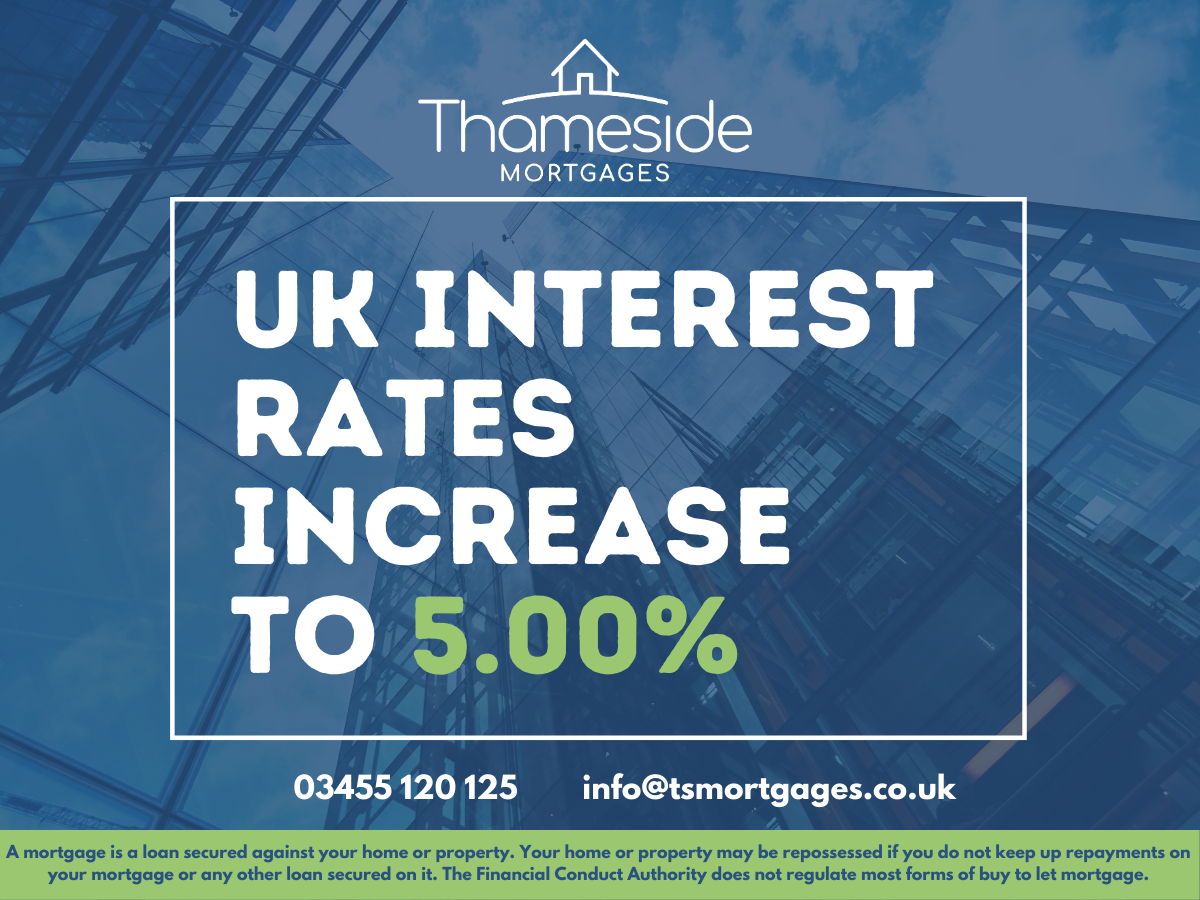The Bank of England has risen interest rates for a 13th consecutive time as it continues to tackle rising prices.
Experts were predicting a slight fall in inflation figures in May, but official data on Wednesday showed inflation was still stuck at 8.7% in May, due to increased prices for second-hand cars, flights and supermarket food prices.
The Base Rate of 5.00% is the highest the UK has seen since 2008.
Just one month ago experts were predicting we were nearing the end of rate rises, but the rhetoric has changed as base rate could now reach 6.00% – a figure not seen since the 1990’s.
Thameside Mortgages Managing Director, Andrew Sheen pointed out “a fundamental role of the Bank of England is to control inflation. It’s painfully obvious increasing rates has been an ineffective tool against inflation.
“Rather than stubbornly sticking to the same methods, they should take a moment to pause and consider a different approach before causing significant harm to the economy and people’s livelihoods.”
What’s happening to mortgage rates?
Lenders have been frantically withdrawing and increasing rates since the inflation announcement in May. This month’s news hasn’t offered much good news and lenders have continued to increase their deals accordingly.
This is because the market conditions has led to a significant rise in SONIA, or Swap Rates.
To help you understand what this means, SONIA stands for Sterling Overnight Index Average. It is the average interest rate that banks pay to borrow money overnight from other banks in the UK.
When SONIA rates rise, it means that it is more expensive for banks to borrow money. This can lead to higher mortgage interest rates. Conversely, when SONIA rates fall, it means that it is cheaper for banks to borrow money. This can lead to lower mortgage interest rates.
SONIA rates have been rising due to a number of factors, including the Bank of England raising interest rates in an effort to control inflation.
As a result, the average two-year fixed rate according to Moneyfacts was 6.15% (21st June). The average 5-year fixed rate was 5.79%.
This is an increase of approx. 0.65% in just 3 weeks, adding hundreds to the cost of mortgages.
When will mortgage rates come down?
The answer to this question is ‘no one knows’.
We are likely to see a fall in UK interest rates and mortgage rates in general once the UK economy has managed to control inflation levels and bring them down from their current levels.
The Bank of England are targeted to keep inflation at 2.00%. While 8.70% is lower than the highs of 11.10% back in October 2022, it’s a lot higher than they expected it to be in June 2023.
My mortgage deal is ending, what should I do?
We’re reaching out to our existing clients 7 months before their deal comes to an end, as most mortgage offers are valid for a 6-month period.
If your current deal expires in January 2024, securing a deal now means you can have the peace of mind in having a rate secured if rates continue to rise.
A few months later, our team can revisit the market and confirm if the rate you already have secured is the best. If rates have continued to increase, we did the right thing. If rates have dropped, we can jump ship knowing you’re not committed to a particular deal.
Looking into your options early gives you 2-3 chances of securing the best deal – leaving it to the last-minute narrows down your options.
Furthermore, some mortgage lenders will not offer existing customers a deal until 90 days left on the current deal, which also narrows down those options. However, if the rate the lender offers in a few months is more competitive, we can always secure that deal instead.
“A fundamental role of the Bank of England is to control inflation. It’s painfully obvious increasing rates has been an ineffective tool against inflation.
Rather than stubbornly sticking to the same methods, they should take a moment to pause and consider a different approach before causing significant harm to the economy and people’s livelihoods.”
Andrew Sheen, Thameside Mortgages
What is a Fixed Rate?
A fixed-rate mortgage is a type of mortgage where the interest rate remains the same for a set period of time, typically between two and ten years. This means that the borrower’s monthly mortgage payments will remain the same for the entire fixed-rate period, regardless of any changes in the Bank of England’s base interest rate or other economic factors.
At the end of the fixed-rate period, the mortgage usually reverts to the lender’s standard variable rate (SVR), which can result in a significant increase in the borrower’s monthly payments. Borrowers may choose to remortgage or switch to a different type of mortgage before the end of the fixed-rate period to avoid this potential increase.
Fixed-rate mortgages can provide borrowers with stability and predictability in their monthly mortgage payments, making it easier to budget and plan for the future. However, the initial interest rate for a fixed-rate mortgage may be higher than that of a variable-rate mortgage, and borrowers may miss out on potential savings if interest rates decrease during the fixed-rate period.
If I choose to fix, how long should I fix for?
This is the million-pound question.
Most people tend to fix their mortgage payments for 2 or 5 years. When we look at current mortgage rates, 5-year Swaps are lower than 2 years, simply because UK Interest rates are expected to be lower in 5 years’ time than they are in the next 2 years.
As a result, at the time of writing, a typical 2-year fixed rate will cost more than a 5-year fixed.
If you opt for a shorter-term fixed rate, you do so in the hope that interest rates have reduced in the next 2 years. If you prefer longer term stability, a 5-year fixed rate will offer this, but given that you’re likely to be tied into a long-term deal, there is a risk you end up trying to come out of the deal to secure a better one, paying thousands to come out of the deal – this is called an Early Repayment Charge.
No one knows the right answer and it’s best to choose a deal that suits your circumstances. If you plan on moving/selling in the next 2-3 years, you might not want to tie in for too long. However, if you are risk adverse and like stability of payments, a longer-term fixed rate would offer this.
What about a Tracker/Variable Rate?
A tracker rate mortgage is a type of mortgage where the interest rate is tied to an external benchmark, usually the Bank of England’s base rate. The interest rate on a tracker mortgage will change in line with the benchmark rate, so if the base rate goes up or down, the interest rate on the mortgage will also go up or down.
For example, a tracker mortgage might be advertised as “base rate + 0.25%”, meaning that the interest rate on the mortgage will be set at 0.25% above the Bank of England’s base rate. If the base rate is currently 5.00%, the interest rate on the mortgage will be 5.00%. If the base rate increases to 6.00%, the interest rate on the mortgage will increase to 6.25%.
Tracker mortgages can offer flexibility and potentially lower interest rates than fixed rate mortgages, as borrowers can benefit from any decreases in the base rate. However, they also come with the risk of increased payments if the base rate rises. It’s important to carefully consider your financial situation and the potential risks and benefits before choosing a tracker rate mortgage.
If you choose a tracker rate mortgage, you’re doing so on the understanding you’re taking a gamble that interest rates are going to come down in 2024-25, even if they continue to rise in the short term.
Get in Touch
In summary, there are several benefits to getting in touch with Thameside Mortgages early if you have less than six months left on your mortgage deal. By securing a deal early, you can avoid the risk of a higher interest rate, have more time to explore your options, and plan your finances more effectively.
In summary, there are several benefits to getting in touch with Thameside Mortgages early if you have less than six months left on your mortgage deal. By securing a deal early, you can avoid the risk of a higher interest rate, have more time to explore your options, and plan your finances more effectively.
Contact Thameside Mortgages today to learn more about how they can help you secure a great deal.
You can call us on 03455 120 125, or complete the form below.
Post from Thameside Mortgages


